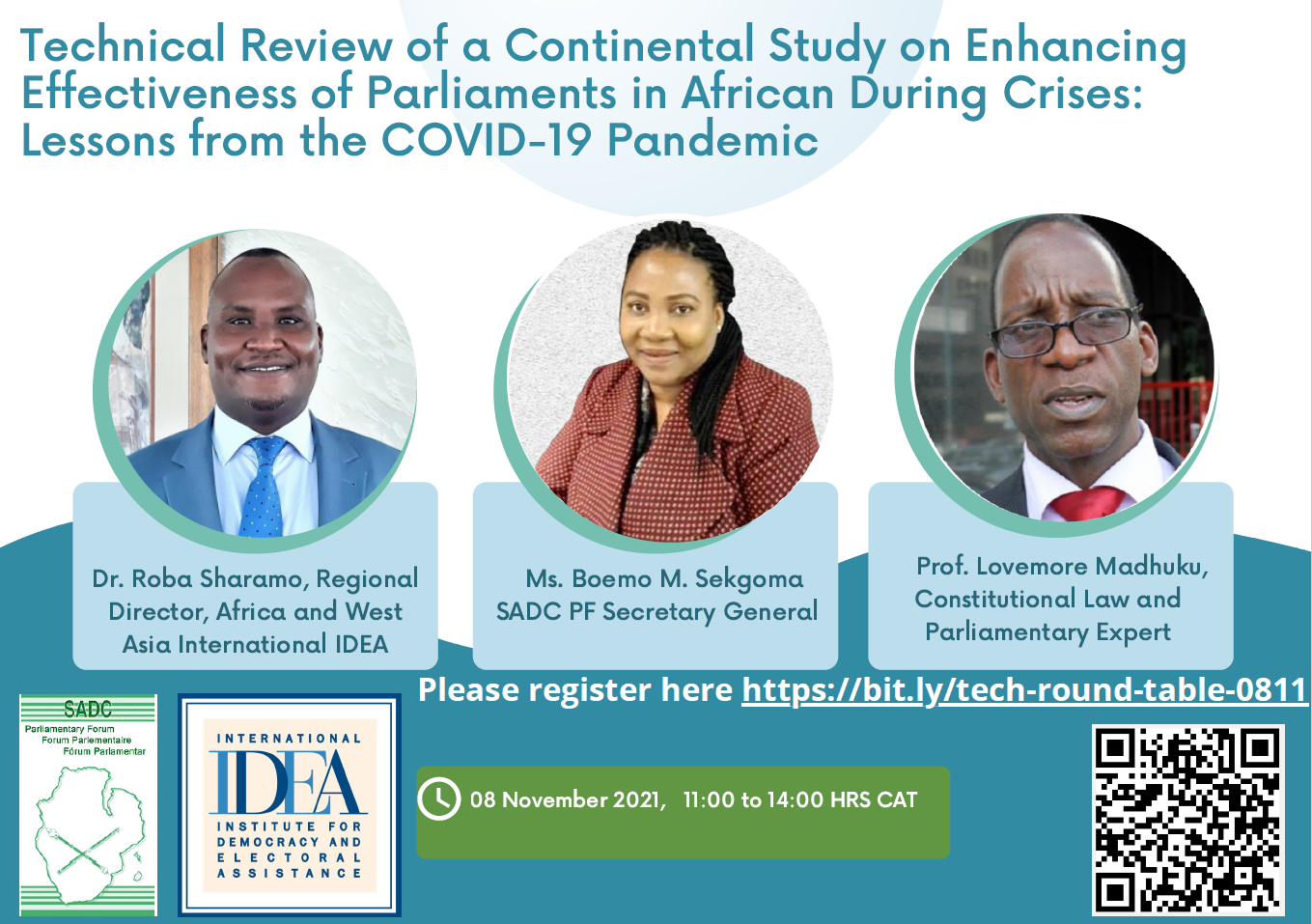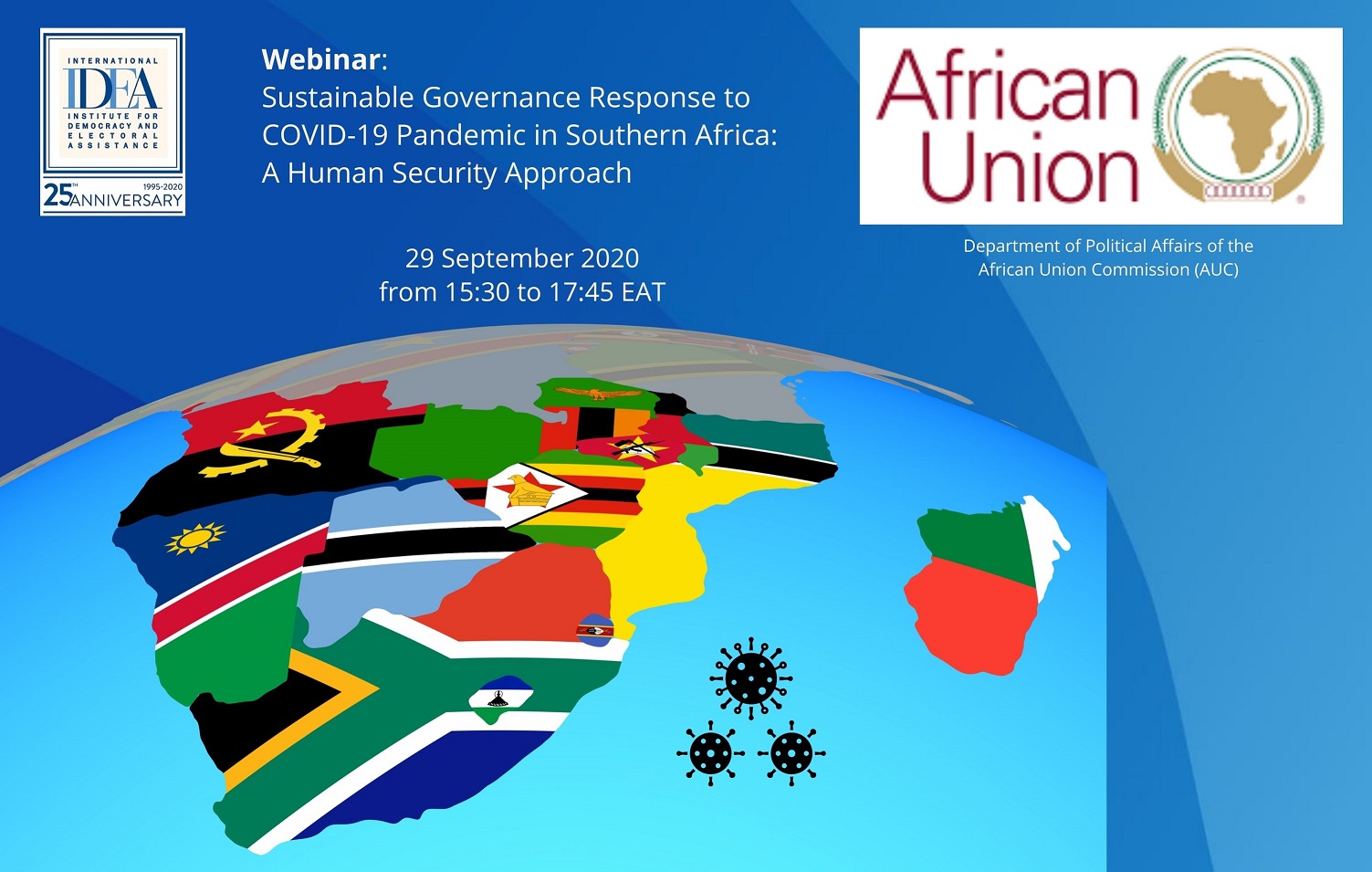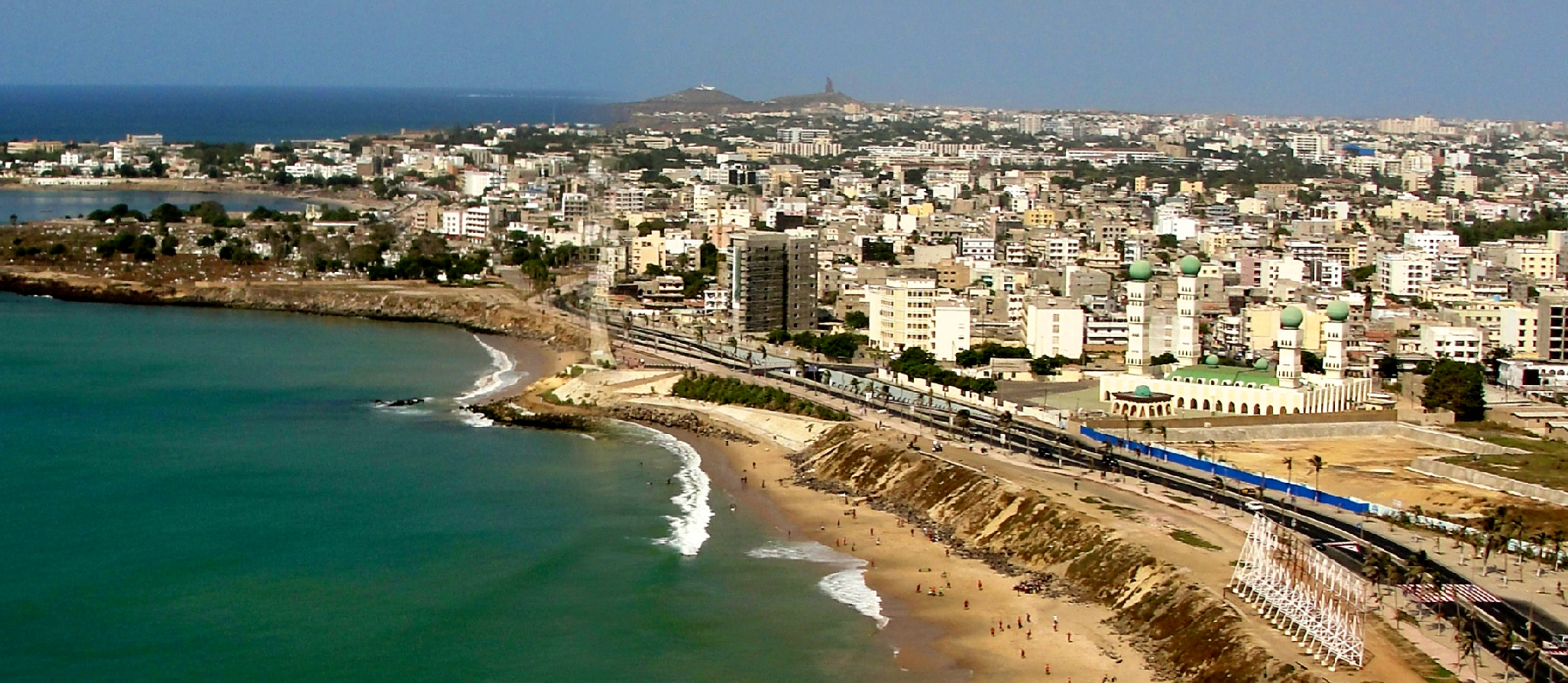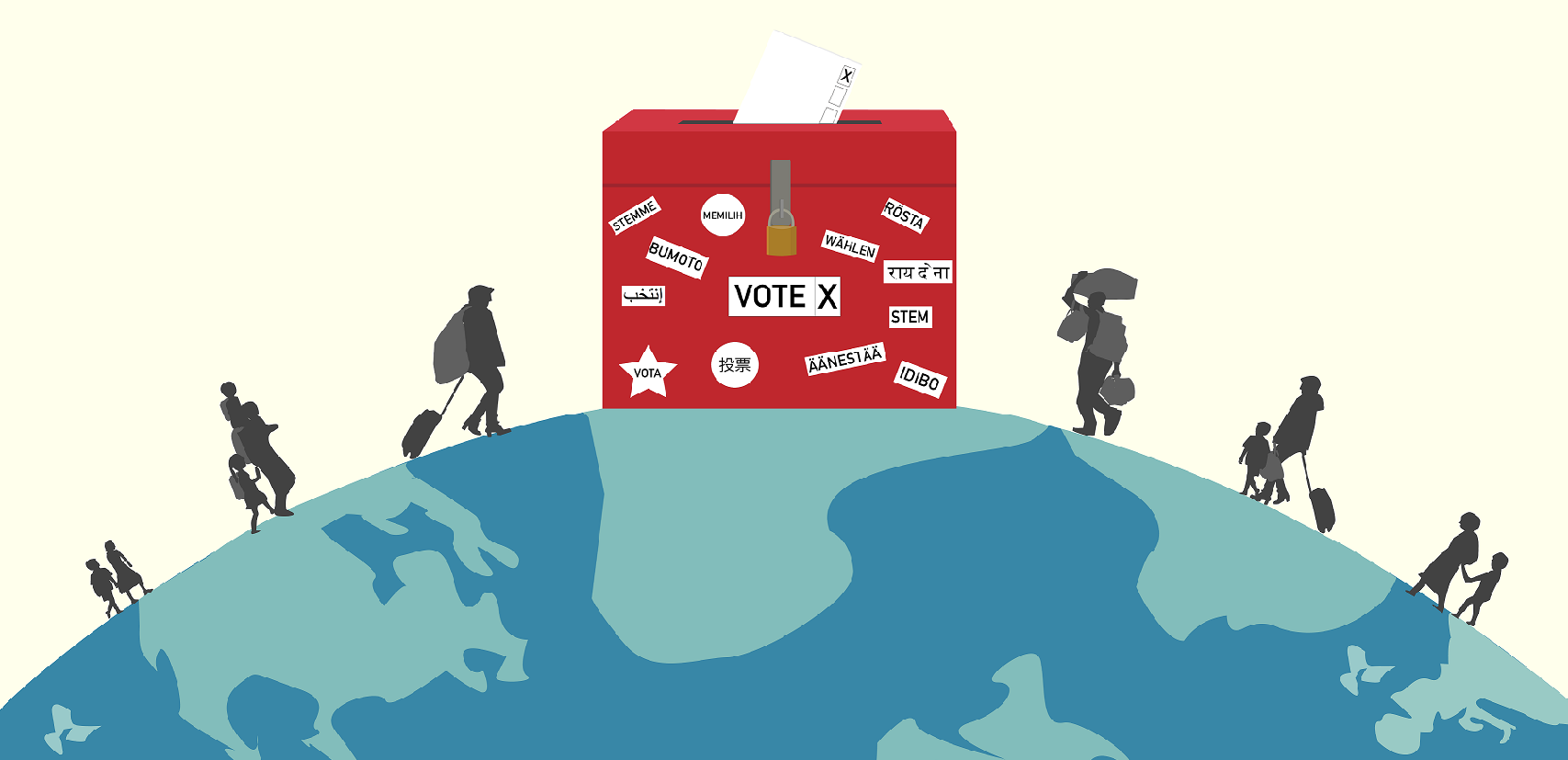Continental Study on Enhancing Effectiveness of Parliaments in African During Crises: Lessons from the COVID-19 Pandemic

As the Covid-19 pandemic continues to take a devastating toll on public health, economies, and livelihoods globally since December 2019, it also affects the maintenance and preservation of democracy. Africa as a continent has also been severely affected. The need to contain the spreading of the pandemic has led to the countries adopting various forms emergency measures depending on their context. These measures, arguably necessary to mitigate the spread of Covid-19, have fundamentally changed the way people and institutions conduct business. Parliaments have not been spared as Covid-19 related restrictions have not only created unique challenges for the continuity of Parliament’s role in legislating, ensuring checks and balances through oversight and representing the citizens during the crisis, but it also laid bare the glaring inadequacies for most Parliaments to timely respond and adjust to the crisis.
Undoubtedly, Covid-19 has exposed structural weaknesses on oversight and accountability mechanisms and capacity for Parliaments across the different sub-regions of the continent. In response to the challenges of remote working and social distancing, many parliaments across Africa have found ways to remain functional by developing new procedures and standing order and methods of working aligned to the new realities. In some cases, the crisis resulted in Executive branches of Government relying on the emergency powers to enact laws regulating the emergency measures and framework of their enforcement without the input of Parliaments.
It must be emphasised that it is the constitutional duty of Parliaments to hold the emergency responses up to scrutiny to prevent abuse and excess by the Executive arm, while ensuring that public health systems and social services receive adequate support and that adequate measures are put in place to protect people's immediate livelihoods. While fast-track processes may limit Parliament’s ability to exercise thorough scrutiny on emergency legislation before taking effect, it is imperative for Parliament to put in place a continuous review mechanism to ensure timely course-correcting as necessary. For effective scrutiny of emergency response, Parliamentarians need inter alia, systematic access to information by the responsible government agencies, experts, constituents, and local authorities.
As has been observed during the Covid-19 pandemic, it may be difficult or even impossible for Parliamentarians to meet in person during a crisis. Such as during wartime, natural disaster or, as in, the outbreak of pandemics. In such cases, Parliaments may delegate decision-making to the Executive arm of the Government by granting it special powers. There are various emergency powers provided in different jurisdictions across the world. Nevertheless, it remains Parliament’s responsibility to protect constitutionalism and rule of law. In this regard, Parliaments must not abdicate their primary responsibility of law-making by over-delegating their responsibility of legislating as this would be an affront to constitutionalism and rule of law. Thus, even when parliamentary oversight must be suspended during an emergency favouring efficient decision-making, it is still crucial that legislatures play the roles that make democratic systems ultimately more durable.
While several benchmarks for parliamentary effectiveness have been developed globally, such as the Benchmarks for Democratic Legislatures in Southern Africa, which the SADC Parliamentary Forum adopted in 2010, there are limited guiding frameworks developed at the regional and global level to enhance the effectiveness of parliaments during crises.
In 2020, in collaboration with SADC PF and CDD West African, International IDEA convened a webinar to reflect on the Impact of COVID-19 on Parliaments in Africa. In addition, SADC PF in collaboration with GIZ and International IDEA hosted a regional capacity building Webinar on the role of Parliament in protection constitutionalism and rule of law.
Context and Objectives of the Technical Roundtable
As a follow-up to the above activities, International IDEA and SADC PF will jointly convene a regional dialogue to deliberate on possible reforms to enhance the effectiveness of African Parliaments during crises. The high-level policy dialogue must be viewed within the context of the existing strong collaboration between International IDEA and SADC PF, dating back to 2004. The collaboration seeks to, inter alia, strengthen capacities for democratic legislatures, building sustainable democracy through the provision of comparative knowledge, and promoting democratic reforms by influencing laws and policies. The collaboration leverages the respective mandates of the two organisations.
In July 2021, International IDEA and SADC PF commissioned a continental study on Enhancing Effectiveness of Parliaments in African During Crises: Lessons from the COVID-19 Pandemic.
More specifically, the study seeks to:
(i) Analyse parliamentary effectiveness during the COVID-19 pandemic;
(ii) Undertake comparative review of national legal frameworks guiding parliamentary effectiveness during crises;
(iii) Analyse regional and sub-regional frameworks guiding parliamentary effectiveness during crises; and
(iv) Proffer adaptable recommendations and strategies for sustaining parliamentary effectiveness during crises.
Objectives of the validation and review dialogue
The objective of the dialogue is to provide a platform to parliamentarians and experts to critique and enrich the draft continental study report on enhancing parliamentary effectiveness during crisis. Participants in the dialogue session will provide input on the experiences of national and regional Parliaments in responding to the COVID-19 pandemic and draw lessons to enhance effectiveness during future crisis.
Participation and format of the event
The dialogue will bring together representatives of national and regional parliaments, parliamentary experts, academia, civil society and democracy and governance experts. The event will be held virtually, given the COVID-19 pandemic situation. Participants will receive a presentation on study findings and recommendations. This will be followed by extensive deliberations and experiences sharing by participants and recommendations.
PROGRAMME
11:00 –11:10 - Online Registration of participants
11:10 –11:15 - Remarks by International IDEA representative
- Dr Roba Sharamo, Regional Director, Africa and West Asia
11:15 -11: 20 - Remarks by SADC PF representative
- Ms Boemo M. Sekgoma, SADC PF Secretary-General
11:20 –11:30 - Global Comparative Overview of Parliamentary responses to Covid-19: Emerging Lessons on Enhancing Effectiveness of Parliaments in Crisis Situations.
- Dr Jonathan Murphy, Head of INTER PARES Programme, International IDEA
11:30 –12:30 - Presentation of study findings and recommendations
- Professor Lovemore Madhuku, Constitutional Law Expert
- Country experts: Cameroon, Mozambique, Gambia, South Africa, Nigeria, Kenya, Tunisia and Zimbabwe
Moderator: Gram Matenga, Programme Manager, International IDEA, Africa and West Asia
12:30 -13:50 - Plenary Session
13:50 -14:00 - Concluding remarks and way forward
- Sheuneni Kurasha, SADC PF Programme Manager Democracy and Governance and Parliamentary Business Focal Person
14:00 - End of Programme
REFERENCES
- UNDP. 2020. Accountability and COVID-19, a guidance note on inclusive processes and institutions
- Jonathan Murphy. 2020. Parliaments and Crisis: Challenges and Innovations
- Benchmarks for Democratic Legislatures in Southern Africa



